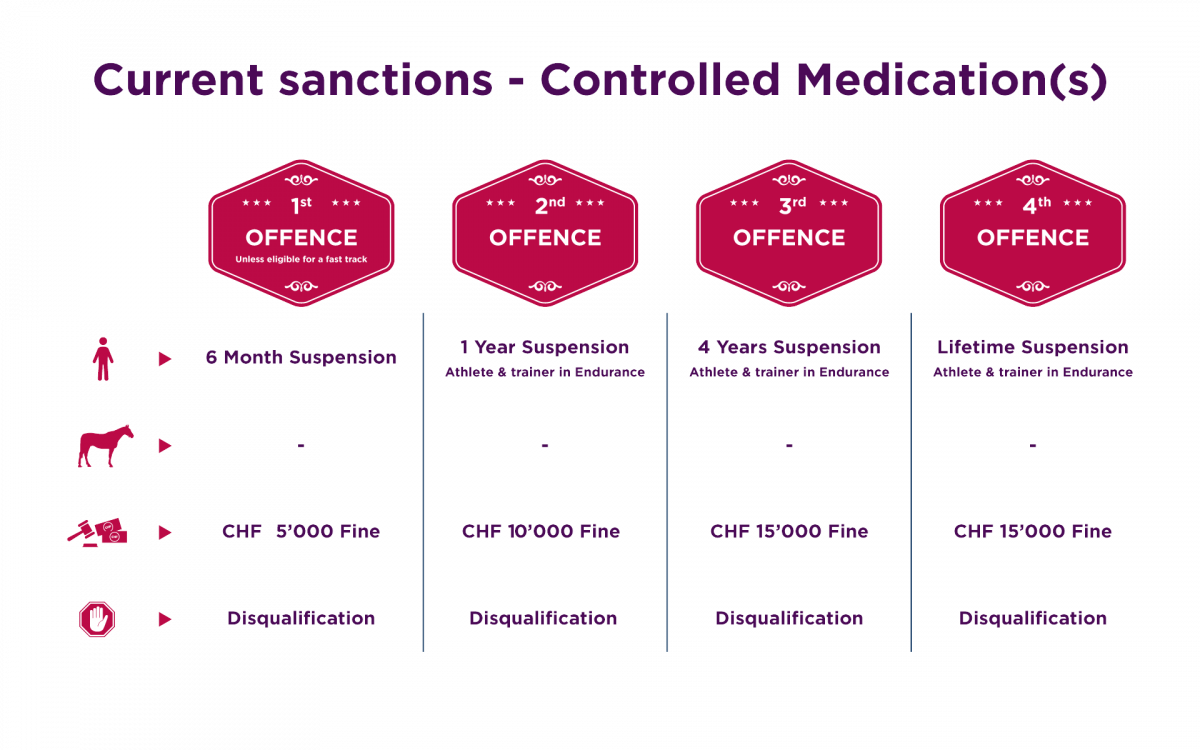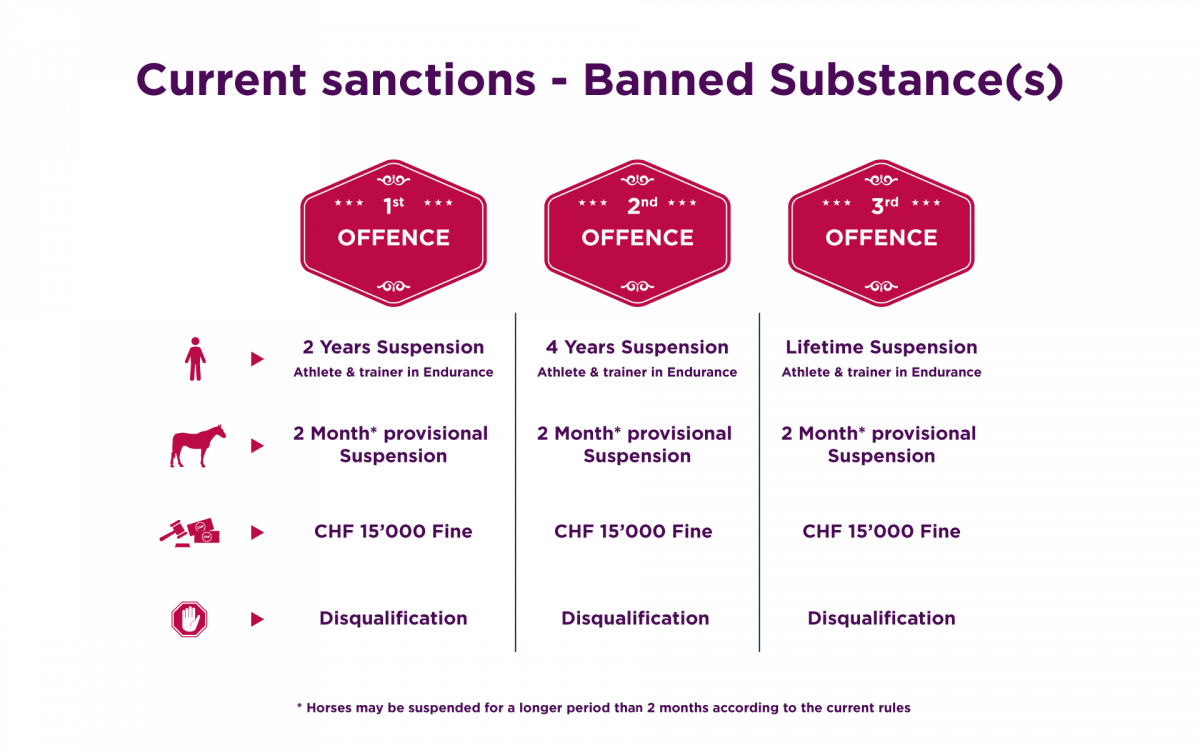 Campus
Campus


The FEI Tribunal has more flexibility in sanctioning and the Athlete is not usually provisionally suspended (even if the Specified Substance is a Banned Substance) if:
♦ No Fault/Negligence is established, there is no ineligibility period imposed against the rider.
♦ No Significant Fault/Negligence is established, the minimum sanction is a Reprimand.
The standard level of ineligibility period is 4 years where:
♦ It does not involve a Specified Substance, unless the Athlete can establish that it was not intentional
♦ It involves a Specified Substance and the Anti-Doping Organisation can establish that it was intentional
Harmonisation of sanctions has been one of the most discussed and debated areas of anti-doping. Harmonisation means that the same rules and criteria are applied to assess the unique facts of each case.
![]()
Arguments against are based on differences between sports including, for example, the following: in some sports the Athletes are professionals making a sizable income from the sport and in others the Athletes are true amateurs; in those sports where an Athlete’s career is short, a standard period of Ineligibility has a much more significant effect on the Athlete than in sports where careers are traditionally much longer.
![]()
A primary argument in favour of harmonisation is that it is simply not right that two Athletes from the same country who test positive for the same Prohibited Substance under similar circumstances should receive different sanctions only because they participate in different sports.
In addition, too much flexibility in sanctioning has often been viewed as an unacceptable opportunity for some sporting organisations to be more lenient with dopers.
Currently the same harmonised sanctions apply for all Athletes regardless of the Discipline (same concept as WADA Code).
The only specificity for one Discipline is in Endurance where an additional sanction applies to the Trainers. This is possible because Endurance Trainers must be registered with the FEI. In Endurance, particularly in certain regions, it is accepted that the day to day care of the Horse is usually managed by the Trainer.
There is therefore a mandatory and automatic Provisional Suspension on the registered Trainer in Banned Substance cases. In addition, the registered Trainer is also provisionally suspended even if there is only 1 Controlled Medication in the Sample, if that Trainer has a pending or prior violation of the EADCMRs (with the same Horse or another Horse).
The current Equine Anti-Doping system is already quite complex, with Banned Substances, Controlled Medications, Specified Substances, and it is felt that the same sanctions should apply to all Athletes, regardless of their Discipline or level.
Of course an Athlete may make an application to the FEI Tribunal and explain any exceptional circumstances/facts and reasons as to why a fine to be imposed, if any, should be lower than the “standard” fine. For example, if the Athlete competes at lower levels only (such as 1* and 2* competitions) and/or has “low” revenues/income.
But the ineligibility period imposed should be at the same standard level across all Disciplines.
General Legal Principles
The FEI can only impose restrictions and sanctions that (i) are designed to pursue a legitimate imperative; (ii) are necessary in order to achieve that objective; and (iii) are proportionate.
Suspending a Trainer in Endurance and all his/her horses
It could lead to the exclusion of a lot of horses (to the detriment of their owners and riders, and to the sport generally) even though there may be no suspicion whatsoever that they are tainted in any way by their association with the trainer.
Some Endurance Trainers are responsible for a large number of horses and many may not have been connected in any way to the issue that prompted provisional suspension of the trainer.
Provisionally suspending not only the Trainer but also all of the horses s/he trains may be intended to achieve legitimate objectives (deterring trainers from bad acts, protecting the sport from potentially tainted actors), but it goes further than is necessary to achieve those objectives.
What if at the same event one horse registered with a Trainer tested positive for a Banned Substance but another horse registered with that Trainer tested clean?
The owner of the second horse would clearly have a good argument against its horse being suspended.
But even if there were other horses at the Event also registered with that Trainer who were not tested, and so did not have a chance to show they were clean, it still seems too much of a leap to exclude them because they are associated with a trainer who has another horse that tested positive.
In addition, under current FEI policy, even a horse that has been found to have a Banned Substance in its system is only provisionally suspended for two months.
Why then would it be necessary to exclude other horses registered to the same Trainer out for longer than that even though they never even tested positive?
Unlike in racing, the FEI does not license “yards” or stables so the option of temporarily shutting down a trainer’s entire yard/stable is not available to the FEI.
Other Legal considerations
The Court of Arbitration for Sport (CAS) has accepted that anti-doping sports sanctions must respect the principle of proportionality.
This is why automatic lifetime bans for a first offence are not possible.
The same applies with the international human rights principles.
Strict sanctions must not be automatic and they must be adjustable depending on the circumstances.
The modularity of sanctions originates in the consideration of several circumstances: the nature of the prohibited substance, the gravity of the individual fault or negligence, behaviour during the procedure (“prompt admission”), or even age (minors).
Conclusion on the Trainers in Endurance
It is suggested to keep the current sanction mechanism against the Trainers in Endurance.
Team Disqualification
We have two different approaches to team disqualification:
♦ At the Olympic Games, Paralympic Games, FEI World Equestrian Games, if a member of a team is found to have committed a violation of the Equine Anti-Doping Rules, the results of the Person Responsible will be disqualified in all Competitions and the entire team disqualified.
♦ At all other Events, the results of the Person Responsible may be disqualified in all Competitions and will be subtracted from the team result, to be replaced with the results of the next applicable team member. So this means that at all other Events the disqualification of the Athlete’s results in all other competitions at the Event is not automatic.
Do you want to keep a different team disqualification system depending on the Event where the doping violation takes place?
Or would you prefer to have the same principle that the whole team shall be disqualified if one team member breached the FEI Anti-Doping Rules regardless of the Event? For example, if a member of a Nations Cup team tests positive, should the whole team be automatically disqualified?
Questions for National Federations, Athletes, Support Personnel, Stakeholders
While some changes to the EADCMR will be mandatory to ensure that the FEI remains WADA compliant, the FEI has scope in some areas to adapt the rules to reflect the specificities of equestrian sport. Have your say and let us know what you think about some of the questions and proposed changes below. You will find HERE a template with all the questions regarding the changes to the EADCMR which you can respond to in their entirety or individuallyNote that where relevant we have included some references in order to provide you with the background and rational for the proposed changes or position on changes. You can send your feedback directly by email to Áine Power, FEI Deputy Legal Director and Mikael Rentsch, FEI Legal Director.
![]()
Do you want to increase the standard level for Banned Substance cases from 2 years to 4 years to align with the WADA Code and the FEI Anti-Doping Rules for Human Athletes?
Shall the same standard level (be it 2 years or 4 years) apply across all FEI Disciplines?
Further increase the Sanctions? If so, how?
![]()
Do you want to keep a different team disqualification system depending on the Event where the doping violation takes place?
Or would you prefer to have the same principle that the whole team shall be disqualified if one team member breached the FEI Anti-Doping Rules regardless of the Event? For example, if a member of a Nations Cup team tests positive, should the whole team be automatically disqualified?
We use cookies on this site to enhance your user experience.
By clicking any link on this page you are giving your consent for us to set cookies.